
JOURNAL OF AGRICULTURAL AND RESOURCE ECONOMICS
Scope & Guideline
Bridging theory and practice in agricultural economics.
Introduction
Aims and Scopes
- Economic Analysis of Agricultural Policies:
The journal focuses on evaluating the economic implications of various agricultural policies, including trade agreements, subsidies, and environmental regulations, providing insights into their effectiveness and efficiency. - Risk Management in Agriculture:
Research published in the journal often explores risk management strategies within agricultural contexts, including crop insurance, market volatility, and climate-related risks, emphasizing how farmers can mitigate potential losses. - Consumer Preferences and Market Dynamics:
A significant area of focus is understanding consumer behavior and preferences regarding agricultural products, which includes studies on food safety, labeling, and the impact of marketing strategies on consumer choices. - Sustainability and Environmental Economics:
The journal includes research that examines the economic aspects of sustainable agricultural practices, conservation efforts, and the valuation of ecosystem services, contributing to discussions on environmental stewardship. - Technological Innovations in Agriculture:
There is a consistent emphasis on the role of technology in agriculture, including precision agriculture, biotechnology, and data analytics, assessing how these innovations affect productivity and economic outcomes.
Trending and Emerging
- Impact of Climate Change on Agriculture:
There is an increasing emphasis on studies that explore the effects of climate change on agricultural productivity, risk management, and adaptive strategies, reflecting the urgent need to address this global challenge. - Behavioral Economics in Agricultural Decision-Making:
Research incorporating behavioral economics to understand farmer and consumer decision-making processes is gaining traction, highlighting the psychological factors influencing economic choices in agriculture. - Food Security and Nutrition Economics:
Emerging themes around food security and the economics of nutrition are becoming more prominent, as the journal addresses the critical intersection between agricultural productivity, health outcomes, and economic stability. - Digital Agriculture and Data Analytics:
The rise of digital tools in agriculture, including big data analytics, artificial intelligence, and mobile applications, is increasingly featured in the journal, showcasing how these technologies can enhance productivity and decision-making. - Animal Welfare and Ethical Consumption:
There is a growing body of research focusing on consumer preferences regarding animal welfare, reflecting a trend towards more ethical consumption patterns and their implications for agricultural practices.
Declining or Waning
- Traditional Agricultural Production Techniques:
Research focusing solely on traditional agricultural practices has decreased, as the journal increasingly emphasizes the integration of technology and innovation in farming operations. - Single-Crop Economic Studies:
There is a noticeable decline in studies that analyze the economics of single crops, likely due to a growing recognition of the need for more complex, systems-based approaches that consider multiple crops and their interdependencies. - Historical Economic Analyses:
Papers that predominantly focus on historical economic data without connecting to current trends or future implications are becoming less frequent, as the journal shifts towards more applied and forward-looking economic research.
Similar Journals

Temas Agrarios
Advancing Agricultural Knowledge for a Sustainable FutureTemas Agrarios is a premier scholarly journal focused on the dynamic field of agricultural sciences, published by the University of Córdoba, Faculty of Agricultural Sciences. Since its establishment, this journal has committed to advancing knowledge and fostering research in agricultural practices and policies, contributing significantly to the discourse surrounding food security, sustainable farming, and rural development. With an open access model implemented in 2003, Temas Agrarios ensures that critical information and research findings are readily available to the global academic community, promoting wider dissemination and accessibility. Researchers, professionals, and students can benefit from its insightful articles, which address pressing agricultural issues in Colombia and beyond, enhancing both local and international scientific dialogue. Although specific impact metrics such as H-index and Scopus rankings are not disclosed, the journal's longstanding presence underscores its importance as a platform for high-quality agricultural research.
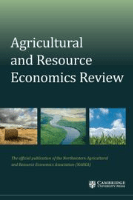
Agricultural and Resource Economics Review
Exploring Innovative Solutions for Agricultural ChallengesAgricultural and Resource Economics Review is a leading peer-reviewed academic journal published by Cambridge University Press, dedicated to advancing scholarship in the fields of agricultural and resource economics. Since achieving Open Access status in 2016, it has significantly broadened its reach, allowing researchers, professionals, and students across the globe to engage with cutting-edge research and innovative methodologies. The journal, which boasts an impact factor reflective of its strong standing in both Agronomy and Crop Science (Q2) and Economics and Econometrics (Q2), aims to provide a platform for the dissemination of high-quality research that informs policy and practice in the agricultural sector. With a publication history spanning from 2004 to 2024, the journal continuously strives to foster interdisciplinary exchange and contribute vital insights that shape sustainable resource management. Emphasizing quantitative analysis and empirical research, Agricultural and Resource Economics Review remains a crucial resource for those involved in the dynamics of agricultural economics and resource management in today's ever-evolving landscape.
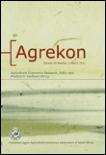
Agrekon
Cultivating Knowledge for Economic and Environmental SustainabilityAgrekon, published by ROUTLEDGE JOURNALS, TAYLOR & FRANCIS LTD, serves as a premier academic platform in the fields of Agronomy, Economics, and Geography, with a focus on the intersection of agricultural practices and economic development. With an ISSN of 0303-1853 and an E-ISSN of 2078-0400, this esteemed journal boasts a commendable academic standing, reflected in its 2023 quartile rankings of Q2 in Agronomy and Crop Science and Geography, Planning and Development, and Q3 in Economics and Econometrics. Established in 1962 and running through 2024, Agrekon continues to be a vital resource for researchers, professionals, and students committed to advancing knowledge in sustainable agricultural practices, economic policies, and spatial development issues. The journal is not open access, yet its findings and discussions are highly regarded within the academic community, offering insights that drive innovation and inform policy decisions across the globe. Engaging with Agrekon equips scholars with a rich compendium of research that bridges theoretical knowledge and practical application in the agricultural and economic sectors.
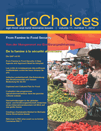
EuroChoices
Illuminating contemporary issues through rigorous research.EuroChoices, published by WILEY, is a leading journal in the fields of economics and geography, demonstrating a significant impact as evidenced by its exceptional rankings—Q1 in both Economics, Econometrics and Finance and Geography, Planning and Development for 2023. With an ISSN of 1478-0917 and an E-ISSN of 1746-692X, this esteemed journal has been a pivotal platform for scholarly discourse since its inception in 2003, evolving thoughtfully to encompass contemporary issues and trends through 2024. Situated in the United States, it serves as an essential resource for researchers, professionals, and students alike, offering insights that bridge economic theories with geographical perspectives. While it maintains a traditional publishing approach without open access options, the journal continues to thrive, achieving high ranks in Scopus—with Economics positioned 37th out of 242 and Geography at 151st out of 821—highlighting its role as a critical contributor to the academic community.
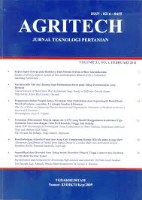
Agritech
Shaping Sustainable Practices for a Greener TomorrowAgritech is a prominent open-access journal dedicated to advancing the field of agricultural technology. Published by UNIV GADJAH MADA, FAC AGRICULTURAL TECHNOLOGY, this esteemed journal disseminates innovative research and cutting-edge practices that contribute significantly to sustainable agriculture, precision farming, and environmental stewardship. Launched in 1999, Agritech has established itself as a vital resource for researchers, professionals, and students alike, providing a platform for the exchange of ideas and findings that shape the future of agricultural technology. By embracing an open-access model, the journal ensures that high-quality research is accessible to a global audience, promoting collaboration and knowledge sharing in the agricultural community. With an ISSN of 0216-0455 and an E-ISSN of 2527-3825, Agritech remains committed to enriching agricultural practices and policies through rigorous scientific inquiry and innovation.
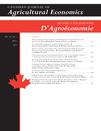
CANADIAN JOURNAL OF AGRICULTURAL ECONOMICS-REVUE CANADIENNE D AGROECONOMIE
Empowering Researchers in Agricultural EconomicsCanadian Journal of Agricultural Economics - Revue Canadienne d’Agroéconomie, published by Wiley, is a premier journal dedicated to the innovative and interdisciplinary study of agricultural economics. With an impressive impact factor highlighting its significance, this journal consistently ranks in the Q1 quartile across multiple categories, including Agronomy and Crop Science, Animal Science and Zoology, Ecology, Economics and Econometrics, and Global and Planetary Change. As part of its robust content, the journal spans articles from 1952 to 2024, contributing valuable insights into the interface of agricultural practices and economic theory. Researchers and professionals in the field will find this journal essential for exploring critical issues affecting agriculture, food security, and sustainability in a global context. Despite its traditional publishing model, the journal's rigorous peer-review process ensures high-quality scholarly contributions that are pivotal for advancing knowledge and academic discourse in agricultural economics.
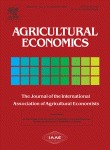
AGRICULTURAL ECONOMICS
Fostering knowledge for a thriving agricultural sector.AGRICULTURAL ECONOMICS, published by Wiley, is a premier journal dedicated to advancing the understanding of agricultural economics, with an ISSN of 0169-5150 and an E-ISSN of 1574-0862. This esteemed publication serves as a vital resource for researchers, professionals, and students in the fields of Agronomy and Crop Science, as well as Economics and Econometrics, consistently reflecting its high standing as evidenced by its 2023 Q1 ranking in both categories. With a comprehensive scope spanning from 1986 to 2024, the journal presents rigorous analysis and innovative research that informs policy decisions and enhances agricultural practices globally. Although it does not provide open access options, the rich academic content invites a dedicated readership committed to strengthening the agricultural sector through evidence-based insights. The journal is particularly noted for its impressive Scopus rankings, placing it among the top-tier resources for understanding the complex interplay between economic theory and agricultural development.

China Agricultural Economic Review
Elevating Academic Discourse in Agricultural SciencesChina Agricultural Economic Review, published by EMERALD GROUP PUBLISHING LTD, is a premier journal that holds a significant position in the fields of agricultural economics and biological sciences. With its ISSN 1756-137X and E-ISSN 1756-1388, this journal has dedicated itself to advancing academic discourse since its inception in 2008 and continues through 2024. It boasts an impressive Q1 ranking in both Agricultural and Biological Sciences and in Economics and Econometrics, reflecting its high-quality research contributions, as evidenced by its standing in the top percentiles of Scopus rankings (97th and 92nd, respectively). Aimed at fostering scholarly exchange among researchers, professionals, and students, the journal invites original research articles, reviews, and case studies that explore vital issues and developments impacting agricultural economies, with a keen focus on both theoretical and practical advancements. As a well-regarded platform within the United Kingdom, the journal promotes accessibility and encourages significant contributions to enhance the understanding of agricultural economic dynamics worldwide.

Agricultural and Resource Economics-International Scientific E-Journal
Championing open access for global agricultural insights.Agricultural and Resource Economics-International Scientific E-Journal is a leading open-access publication dedicated to advancing the fields of agricultural and resource economics. Published by the esteemed INST EASTERN EUROPEAN RESEARCH & CONSULTING since 2015, this journal provides a vital platform for innovative research and discourse, particularly within the context of Eastern Europe. With an impressive Q2 ranking in Agricultural and Biological Sciences and Q3 rankings in both Business, Management and Accounting and Marketing, it serves as a key resource for academics and practitioners alike, fostering collaboration and knowledge exchange. The journal's commitment to accessibility and inclusivity is evident through its open-access policy, allowing researchers from around the globe to share and benefit from cutting-edge findings. Set against the backdrop of a rapidly evolving agricultural landscape, this journal plays a crucial role in exploring the intersection of economics, sustainability, and resource management, making it an essential read for anyone invested in the future of these critical fields.
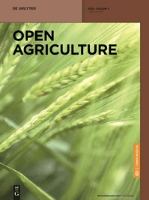
Open Agriculture
Connecting Researchers to Transform Agricultural PracticesOpen Agriculture, published by DE GRUYTER POLAND SP Z O O, is an innovative open-access journal dedicated to advancing research in the Agricultural and Biological Sciences. Since its inception in 2016, this journal has been committed to disseminating knowledge and facilitating collaboration among researchers, professionals, and enthusiasts in the agricultural sector. With an impressive Q2 ranking in the Agricultural and Biological Sciences category, it holds a prestigious position, ranking #65 out of 221 in its field, placing it in the 70th percentile. Open Agriculture offers a platform for high-quality research across a diverse range of topics, ensuring that crucial findings are readily accessible to the global scientific community. The journal continues to uphold its mission of promoting sustainable agricultural practices and innovations that address contemporary challenges in food security and environmental sustainability. With its strong commitment to open access principles, researchers and students alike can easily engage with cutting-edge research and contribute to the vibrant discourse surrounding modern agriculture.